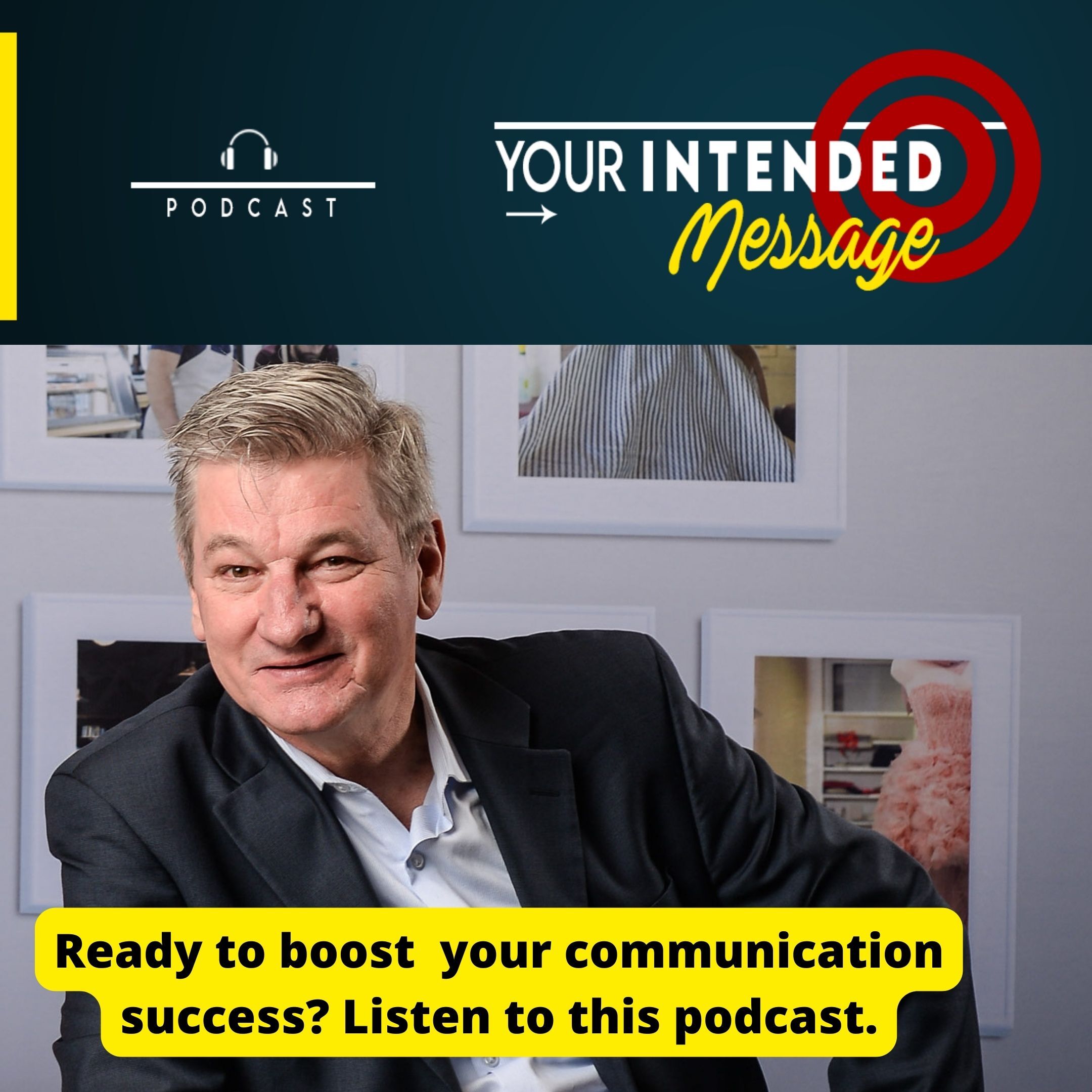
17.5K
Downloads
292
Episodes
The podcast about Effective Communication in Business
Better communication skills will advance your career and business. Are you ready to enhance your understanding and results from better communication? Listen and learn how to deliver Your Intended Message.
Are you willing to cross-examine communication from various perspectives? Would you like to deliver your intended message more effectively?
Listen to Your Intended Message to gain a powerful advantage in your ability to convey your message to your audience, team, clients or marketplace.
Learn from the mistakes and success of communication experts from around the world from different scenarios.
The better communicator has the competitive advantage.
Imagine what that means to you when you improve the success of your next conversation, presentation or message.
Your Host - George Torok
https://yourintendedmessage.com/
The podcast about Effective Communication in Business
Better communication skills will advance your career and business. Are you ready to enhance your understanding and results from better communication? Listen and learn how to deliver Your Intended Message.
Are you willing to cross-examine communication from various perspectives? Would you like to deliver your intended message more effectively?
Listen to Your Intended Message to gain a powerful advantage in your ability to convey your message to your audience, team, clients or marketplace.
Learn from the mistakes and success of communication experts from around the world from different scenarios.
The better communicator has the competitive advantage.
Imagine what that means to you when you improve the success of your next conversation, presentation or message.
Your Host - George Torok
Episodes
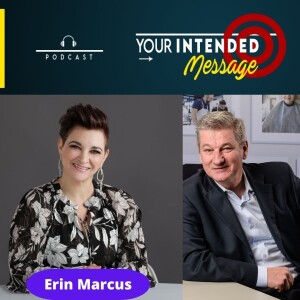
Thursday Nov 23, 2023
How to be more in control of your business: Erin Marcus
Thursday Nov 23, 2023
Thursday Nov 23, 2023
How to clarify your direction and stay on track
The magic formula of intent, responsibility and action
Episode 182 (Erin is based in Chicago)
In this conversation with Erin Marcus we explore:
- The importance of being more in control of yourself
- The need for black and white language in a grey world
- How to develop and employ litmus tests for yourself
- The importance of debriefing every event, project or activity
- The role of both emotion and logic in every buying decision
- Recognizing the dangers of insecurity and desperation
- Aligning your marketing plan with your personality
- A powerful daily exercise to keep you moving toward your short term goals
About our guest Erin Marcus:
Erin Marcus is the founder and CEO of Conquer Your Business, an
international company helping driven entrepreneurs and small business
owners get the financial and emotional freedom they need to build a
business and a life they're proud of.
Having made the successful leap from corporate executive to
entrepreneur, Erin uses that experience, along with her MBA education and
street smart upbringing, to help her clients reach heights they never
dreamed possible. And have fun doing it!
She is host of the podcast, Ready Yet?
Learn more about her podcast and her services at
https://conqueryourbusiness.com/
-----
Excerpts from this conversation with Erin Marcus:
You're either moving towards your goal or away from it.
-----
And one of the things that I learned being immersed in that world is soft language and euphemisms, just give you an out rate soft language and euphemisms for the reality of your situation makes you think you have more time to take care of something makes you think things might not be as hard as they are.
And so to your point, it's a test. I use very bumpers in my gutters, strong litmus tests to set my stage for better decision making.
And that suggests that we need to be willing to make bad decisions and admit that.
I make tons I do. Oh, my God. You can't screw things up more than I've screwed them up. However, it's your decision. And you can't sit back and say, well, it's not my fault. I tried. And they didn't let me.
Yeah, I mean, and I watched that play out over and over and over again. Because the truth is, there's a lot of things in, you know, just, let's just keep in careers and business. There's so much that has to change.
There's so much that has to change with discrimination and access and representation and opportunity. There is so much that has to change. However, you as one individual do not have time to sit back and wait for that change, before you create the life you want for you.
That type of systemic institutional change can take a while. Why would you wait for it? Why would you give that much power away? By waiting for things to happen waiting for change. And I know it's you know, it's an outcome of different dynamics in our society, it's easier to blame other people than take responsibility to wait, you know, the litigiousness of if that's where it is that it is now.
Right, the litigiousness to repeat a potentially new word of our society, like there's this thing we have done to create blame. And it doesn't have to be so myopic, right? It doesn't have to be you whether or not this institution is right or wrong doesn't mean that I don't have to take responsibility for myself.
-----
And I'm a big fan of debrief. I analyze everything, as we record this, we're coming into November, and there's a lot of people that are going to be doing their business planning. Business Planning is something that happens daily.
-----
Read the rest of this entry »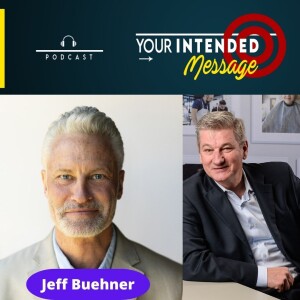
Thursday Nov 16, 2023
The Secret Language of Success: Jeff Buehner
Thursday Nov 16, 2023
Thursday Nov 16, 2023
How to leverage the power of imagination
What is your super-power that you might have forgotten?
Episode 181 ( Jeff is based in Utah)
In this conversation with Jeff Buehner we explore:
- Lessons from the writings of the richest man on earth (its not who think)
- How to direct your self-talk for better results
- What are the seven secrets of Sultan Musa of Mali
- The special language that you can use everyday
- Why the words are less significant when using this language
- What can you find 'out there somewhere'
- The magic of an "out of body experience"
- Understanding the role you are playing and why
- How your subconscious mind controls your life
- The impact of your imagination, beliefs and feelings
- How to guide your feelings to boost your success
- How to create and maintain your vision
- The lesson metaphors from Aladdin and the Magic Lamp
About our guest Jeff Buehner:
Jeff is author of the bestseller, The Sultan's 7 Secrets. He started as a struggling concrete contractor who didn't like talking to people. Within a year of learning the secrets, he had a $20 million dollar company.
You can buy his book on Amazon or get a free copy of the video version here

-----
Excerpts from this conversation with Jeff Buehner:
Unless you're speaking this special language in a way that attracts it. So we're going to jump into that, because that's the intended message. And right now you are sending a message to the world. And you're getting back exactly what you're saying in this language. So if there's anything in your life that you're not happy with, you need to change your intended message.
-----
The next thing he learned is that not only did he have two bodies, but he had two minds working simultaneously.
So there's the conscious mind, that's the part of us that we think of us second. But then there's something called what he called the Veiled mind, the hidden mind. But we can relate to this, because we've all kind of been made aware of this concept of a subconscious mind.
So if I use those two terms interchangeably, you'll understand the Veiled mind, and the subconscious mind. And he said, The veiled mind, is the mechanism that really controls and steers your life, it determines what you get out of life, what your personality is, where you're headed, what you experience, what how much money you're going to have, how many friends you're going to have, how energetic and vibrant you're going to be. Or if you're going to be like really tired all the time and sickly, it determines all of this.
Now, it makes all these important decisions about your life, based on one criteria, and that is what it believes, is true for you.
Or, in other words, what role you're playing what it believes your role is. Now, this is the part that really struck me, all of us are simply playing a role that we're dedicated to, we get into character, and we stay in character.
So if you think of the conscious mind, as an actor, and the subconscious mind as a really good stage manager, that's what you're dealing with. Now, the stage manager is going to set the stage of your life, cars, houses, friends, money, career, all of its going to set the stage of your life with everything that it believes to be congruent with the role you're playing.
And it will pretty much keep everything off the stage that isn't congruent with that role.
-----
Read the rest of this entry »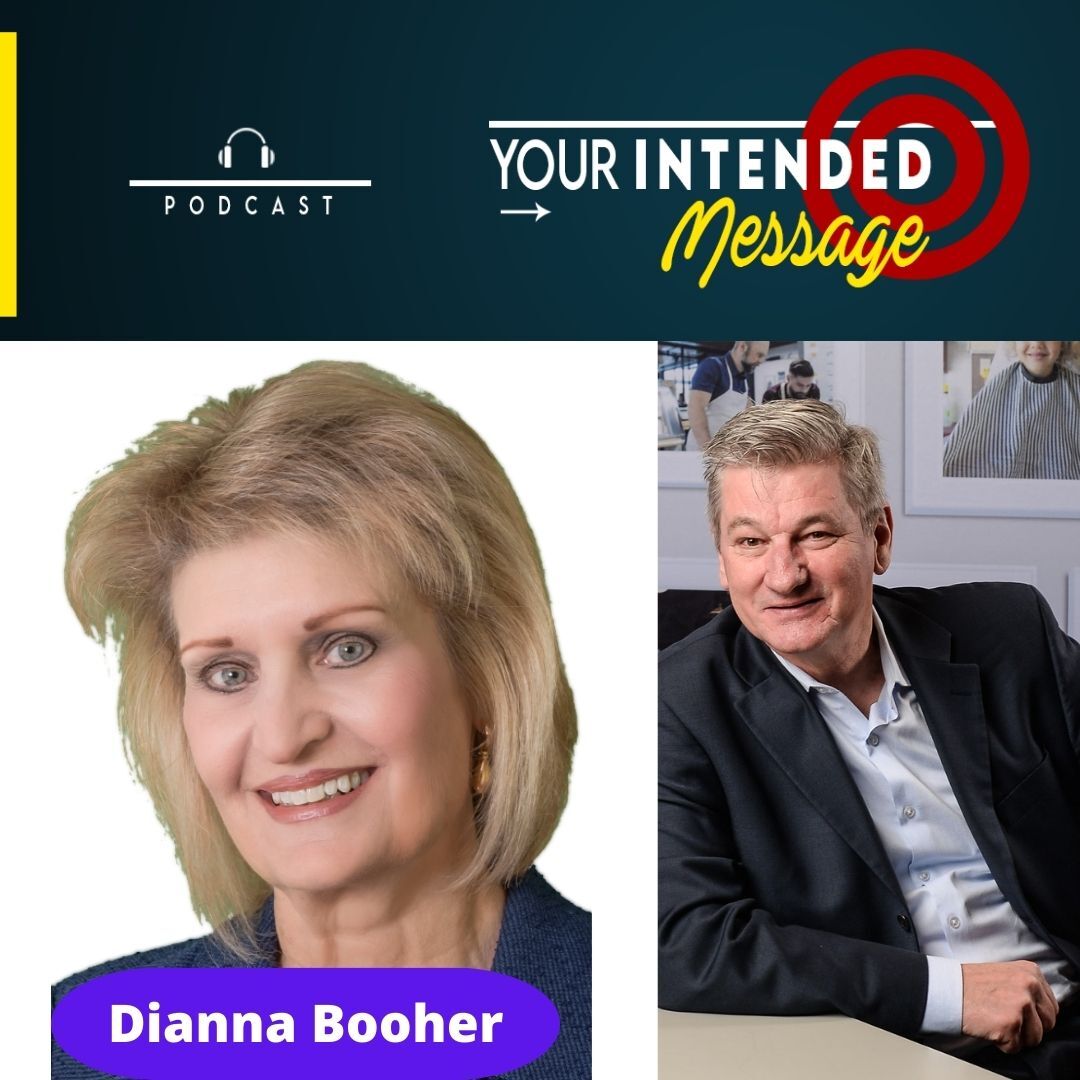
Thursday Nov 09, 2023
How to look more confident when you speak: Dianna Booher
Thursday Nov 09, 2023
Thursday Nov 09, 2023
Convey more confidence in a meeting or hallway conversation
Be intentional with your body language
Episode 180 (Dianna is based in Dallas, Texas)
In this conversation with Dianna Booher, we explore:
- Techniques to convey more confidence when surprised
- How to speak up in a meeting with more intention and confidence
- Nervous body ticks that can sabotage your message
- How to train your body to send positive signals
- How to slow down a conversation while demonstrating calm and comfort
- Handy transition phrases to keep audience attention
- How to handle a brain freeze
- How to encourage your team to participate more readily in meetings
About our guest, Dianna Booher:
Dianna Booher is the author of 50 books—all published by major US publishers (Penguin Random House, Simon and Schuster, HarperCollins, McGraw-Hill), with these available in 62 foreign editions.
As a communication consultant and presentation coach, Dianna has among her clients more than one-third of the Fortune 500 organizations.
Dianna hosts Booher Book Camps, where she helps professionals develop their own bestsellers to get their “intended message” out into the world.
-----
Excerpts from this conversation with Dianna Booher:
How people how business leaders can feel and look more confident when they are speaking whether it's a presentation or whether it's simply a meeting discussion, when you work with your clients to help them look and feel more confident.
-----
One that sort of universally applicable is in your body language.
When you start to speak. If you picture somebody right now standing up to give a briefing or something in your conference room. If they look like they're conferring on their notes, their their eyes are downcast, they're fidgeting, they're stepping back and forward, stepping back and forth. That's nervous movement.
And that tells you that they're not confident about what they're about to say, that may not be your intention, that may not be what you're thinking. But that's how people interpret they interpret monotonous, or repetitive gestures.
Like some people just swirl their hands around often, or they'll put their hands in the pocket out of the pocket in the pocket out of the pocket, or they take one step forward, one step back one step forward, one step back, I used to call that when I was teaching classes on presentation skills, the dance step, you know, the two step,
Your body language communicates, I'm confident, I believe in what I'm about to say, I have some great information that's going to be useful to you. Or it says, I'm really not quite sure that this is going to land correctly, or got the right points with the right audience. They're picking up all of that, from the moment you stand up from your chair, to walk to the front of a conference room, to being on stage, seeing you walk up, you know, I don't care if you're a celebrity speaker walking down an aisle to music, you either look confident and like you're relaxed and going to enjoy the time with them. Are you down? And that communicates a great deal.
-----
So larger movements look more confident.
Yes, taking up more space. You walk into a room and somebody who's walked in, they put either their iPad or their their laptop right in front of them.
And then they throw a jacket over the next chair, and then they pull that chair back so that they can see the angle, they want to be their perspective, they choose that they're taking up space.
But I'm just saying that body language communicates attitude.
------
Read the rest of this entry »
Thursday Nov 02, 2023
How to leverage body language to be more persuasive: Melinda Marcus
Thursday Nov 02, 2023
Thursday Nov 02, 2023
How to read the body language of the room
Master your body language to be more persuasive
Episode 179 (Melinda is based in Dallas, Texas)
In this conversation with Melinda Marcus we explore:
- Why it's important to show and move your hands when you speak
- The perceptions of freeze, fight or flight response
- What are the myths about body language
- How to detect the hidden message by combining verbal and nonverbal
- How to notice and decode hot spots or stress signals
- What do self self pacifying movements suggest?
- How to clarify a suspect stress signal from a meaningless fidget
- How to ready body language of people in a Zoom meeting
- How to use your body language to program your self conscious
About our guest Melinda Marcus:
As a consultant, Melinda has helped executives open doors and close multi-million-dollar deals by showing them how to leverage body language and persuasive psychology strategies.
She is one of 5 people to earn her Master certification in Body Language from Joe Navarro, (the former special agent who trained the FBI).
You can order her book, Read the Zoom here
Find and follow Melinda on Linkedin
https://www.linkedin.com/in/melinda-marcus-m-a-csp-6816484/
-----
Excerpts from this conversation with Melinda Marcus:
When we are confident we tend to be big. When we are being more aggressive. We tend to be big. So again, privately, I like to do very big things, because nonverbals are a two way street, they are communicating to others, and they're communicating to your own brain.
-----
Hotspots is referring to when I see stress signals every time, I asked you a question that is a hotspot for you. Okay, so I may just say something like, Where'd you go to lunch today? And if for some reason, you didn't want me to know about that?
You may answer, but you may not tell me the truth, or you may dodge it, but you will probably show some stress signal with it. So once you know, I'll give you an example of a stress signal.
One thing may be if you were asked me the same question, where did you go to lunch today, and who were you with or something, and I went, Oh, you know, I just went to a place locally around town, it was nothing. I mean, just like a hamburger, the hand coming up to the neck, that tends to be a very clear sign of stress.
Now, it doesn't mean a lie, it means I have stress around that topic. And the reason we do that is the neck is very vulnerable part of the body. And our hand being there protects it.
But also did you notice I started rubbing it, okay, we have something called the vagus nerve that goes down here. And if you massage that, it actually lowers your blood pressure and your pulse rate. So it will come you know, when I see people, when I ask them a question go in here, I know there's a little stress around that.
Ah, so that's a self soothing move.
-----
So a test of a stressful topic is to talk about it go away and come back later and look for a stress signal.
-----
Your brain, your unconscious, is always trying to go to comfort. So it does little things to make you feel more comfortable.
-----
Read the rest of this entry »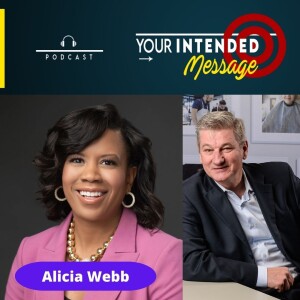
Thursday Oct 26, 2023
How to communicate within your organization: Alicia Webb
Thursday Oct 26, 2023
Thursday Oct 26, 2023
Keep the communication open within your company
People need to know and want to know
Episode 178 (Alicia is based in Chicago)
In this conversation with Alicia Webb, we explore:
- How do discover gaps in internal communication
- Lessons from the pandemic to stay in touch
- The danger of out-of-sight on out-of-mind
- Why people leave when they don't feel connected
- The need to stay informed
- How might you keep your people engaged
- What options and tools might you consider?
- How to communicate major change to everyone effectively
- How to build trust, align goals and reinforce direction
- Why more meetings might not be the answer
- The importance of telling a story
About our guest Alicia Webb:
Alicia is founder and principal of Bright Spot Public Relations. She began her career as a general assignment reporter at an ABC affiliate. You can learn about her services at
-----
Excerpts from this conversation with Alicia Webb:
they were leaving, because they felt like they weren't part of the team. So internal communications is a good place to start. It's a good foundation, to get people keep people engaged, get them to stay
-----
And I can see that failing to keep your employees informed demonstrates that one you don't trust them. You don't respect.
That's a great way to put it. Now, what about the use of a video message from the CEO on a monthly basis?
That's awesome. Great. I think I mean, that we've got great tools. That's the other thing. We're where we've come in our technology, those there's great tools out there that you can use, just make sure using them appropriately.
A video message from the CEO announcing a brand new initiative, that type of thing, a very positive message, I think is great. I would not use a video message to announce significant layoffs or some type of organizational overhaul, I wouldn't do that.
But if you've got some big exciting news and your your stock price has done well or something like that, absolutely, video was a great tool. And honestly, video was a good tool. And I think you know, the short, people don't read as much anymore. People have very, very short attention spans.
So if you can put together a minute a minute 30 video, absolutely, it's a great way to still get your message out in a good way if your leader is is comfortable with it. I know some leaders don't particularly like video.
So be mindful of that get to know your leader and how they feel about being on video because it's not everybody's favourite thing. But I think that this Brian, there's so many great tools out there monthly newsletters, there's so many great ways you can engage your your audience.
And I suppose that you need to engage your audience in more than one way more than one channel. It's too easy to say well, didn't you read the newsletter?
-----
Read the rest of this entry »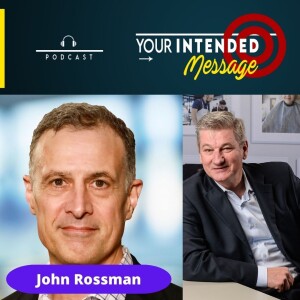
Thursday Oct 19, 2023
The Amazon Way on leadership and leadership: John Rossman
Thursday Oct 19, 2023
Thursday Oct 19, 2023
Leadership and innovation lessons from Amazon
The communication tool that Amazon used to think clearly
Episode 177 (John is based in Washington state)
In this conversation with John Rossman, we explore:
- The Amazon principles of leadership
- How to drive innovation successfully
- The launch of Amazon's marketplace business
- How to build a trusted-customer experience
- How did Amazon push past the online ecommerce leader (EBay)
- Clarifying the mission and purpose of innovation
- How communicating and debating by memos leads to better thinking
- How Amazon made their meetings more productive
- Apply meeting hygiene
- Jeff Bezos' communication style
About our guest John Rossman:
A leadership and digital transformation expert, John Rossman is the author of four books on leadership and business innovation including the best seller "The Amazon Way". He is an early Amazon executive who played a key role in launching the Amazon marketplace business in 2002.
His next book, Big Bet Leadership, will launch in Feb 2024. You can get a free copy of the ebook by registering here
-----
Excerpts from this conversation with John Rossman:
Communication, I believe is one of the oftentimes forgotten, or underplayed elements of what makes successful innovation or transformation.
Amazon has this culture of memo writing. And what we would do is we would write out any new proposal, any problematic situation, any new idea we wanted to do, we would write out and debate in memos. It takes both the writing and the debating to make these things work.
And so Amazon, they call that approach working backwards. So starting with the customer, starting with the outcome that you want, and working backwards.
And a lot of the work that I've done some since Amazon has been taking that philosophy and molding it and mixing it and adapting it into the client's situation. So I have a new book coming out in February of 2024, called Big Bet Leadership.
Part of the underpinnings of Big Bet Leadership is about thinking about outcomes and using memos to help articulate what we believe the problem is that we are solving - what we believe the future state is that we are going to create - what the couple of critical assumptions or operating capabilities are there doing that and then debating those that is essential communication within a core team that has to decide is this the right Innovation?
Is this the right idea? Is this the right big bet for us to do. And so that Amazon philosophy so back to 2002, the market the launch of the marketplace, I wrote the future press release for the marketplace business, there was one line in it that made all the difference to that line was...
A third party should be able to register, sell an item fulfil an order and delight a customer as though Amazon the retailer had done it without talking to anybody in the middle of the night.
-----
Read the rest of this entry »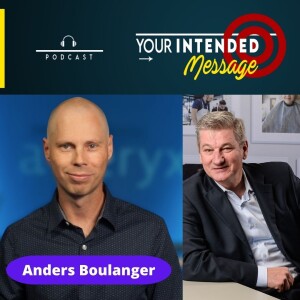
Thursday Oct 12, 2023
How to Profit from Your Trade Show Exhibit: Anders Boulanger
Thursday Oct 12, 2023
Thursday Oct 12, 2023
Get a better return from your trade show booth
How can you people to work the booth for maximum results
Episode 176 (Anders is based in Winnipeg)
In this conversation with Anders Boulanger, we explore:
- The importance of sticking your message to a visual metaphor
- How to find your visual metaphor
- How to grab attention and attract the right people to stop at your exhibit
- How to harness the power of engagement drivers
- How to leverage the power of inductive learning to stick your message
- Mistakes that booth staff make and how to avoid them
- How to attract prospect to stop instead of repelling them with your behavior
- To sit or not to sit in your trade show booth?
About our guest Anders Boulanger:
He has performed at over 200 trade shows. His exhibit clients average a 54% increase is trade show leads.
As well as performing at trade shows, he offers Trade Show Infotaining to prepare your staff for a more productive trade show experience.
Visit engagify.ai
-----
Excerpts from this conversation with Anders Boulanger:
We bring in our unique form of entertainment, that is often magic, mentalism mathematics, martial arts demonstrations, different visual metaphors that we can hang messaging on, to make it memorable and making it exciting and build crowds of people are.
So that's kind of how we help our clients is by attracting attention, keeping them there qualifying the people that are qualified leads and then sending them on through the booth so that they can have that deeper, richer experience.
-----
if you could sit down with a team leader that's about to head off to a trade show with their team, and they haven't been wise enough to hire you to help them out. But if you could still give them one, two or three pieces of advice that they can share with their team. What might be that one, two or three pieces of advice?
Yeah, I would definitely say that, you know, to do a little talk before the show to talk about expectations and goals and unite the team around what is that?
You know, what is the the objective that they have in front of them, if they want to kind of mention a few do's or don'ts to do at least a basic training, that would be a good idea.
And then the last piece I think I would say Georgia is to really go for it. It's like swinging for the fences, the entire show, because so many people on that last day, they phone it in, they phone it in and nobody tries.
And I find the last days my favourite day, because we still go for it. And we can build sometimes bigger crowds than we did on the other days because everyone else stopped trying.
So you know really wring every dollar of value out of your tradeshow investments by working the entire three or four days however long the show is powerful advice.
-----
Read the rest of this entry »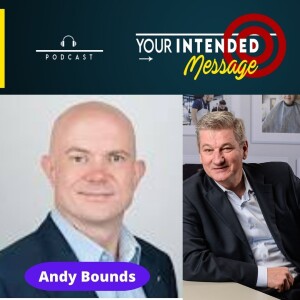
Thursday Oct 05, 2023
How leaders must communicate: Andy Bounds
Thursday Oct 05, 2023
Thursday Oct 05, 2023
A leader needs to communicate on many levels
What must leaders learn about communication?
Episode 175 (Andy is based in the UK)
In this conversation with Andy Bounds we explore:
- Critical communications lesson from his blind mother
- The preparation technique of "guess and ask"
- What's more important than your intended message
- Why the message is simply part of the process
- How to cater your road show presentation to different audiences
- The power of changing the subtitle on your opening slide
- Why your message starts with the desired outcomes
- Why follow-up is crucial to achieving the end goal
- The four steps to achieve the goal
About our guest, Andy Bounds:
Award winning sales consultant – Andy was voted the UK’s Sales Trainer of the Year, as a result of all the sales that I helped my clients win (over $35billion so far)
Best-selling author – his three books on leadership communication and sales are all international best sellers. In fact, the first of them was only kept off the Amazon #1 slot by the final Harry Potter book!
Blind mother – his mum is blind. This has given Andy a lifetime’s experience of communicating from the other person’s point of view. A critical skill for leaders to master – especially since others who are blind to what they are trying to achieve!
-----
Excerpts from this conversation with Andy Bounds:
There is a wonderful quote by the Irish author, George George Bernard Shaw. And he said, the single biggest illusion with communication is the fact that it has taken place.
In other words, let's use simpler language, the biggest mistake people make is they think they've done the communication so it's finished. Okay, or they do a 20 minute events and think that will change everybody for the next year.
The world doesn't work that way.
Yeah, bluntly, habits are long term things. And communication is a short term thing. So we need rigorous reinforcement.
And that's another thing when I'm talking with leaders and how we're going to reinforce things, I say, what are the questions you're going to relentlessly ask?
So make sure people have adopted the new strategy? So let's say we have a new strategy, and it's going to be I don't know, we're going to speak to our customers more?
Well, the leader needs to ask their team almost every single time they see them. How many customers have you contacted this week? Every time so as you walk towards me, I want you thinking Andy's going to ask me how many customers I've contact because he always does.
There has to be this relentless, consistent follow up. Because as a leader, if you ignore that behaviour, you empower it, right? If you ignore that behaviour, you empower it. So if someone doesn't do what you want, if you ignore that, you're empowering them not to do what you want.
So you have to continually reinforce it, use charm, be persuasive, but you can't just ignore it. Otherwise, you're saying you just carry on.
-----
Read the rest of this entry »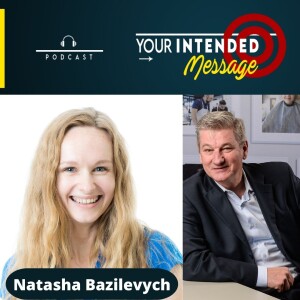
Thursday Sep 28, 2023
How to manage the fear of public speaking: Natasha Bazilevych
Thursday Sep 28, 2023
Thursday Sep 28, 2023
You can become a more confident public speaker
How to beat speech anxiety and nervousness
Episode 174 (This is a repeat of the popular episode #103 with Natasha)
In this conversation with Natasha Bazilevych we explore:
- How to channel your anxiety as positive energy
- How to apply exposure therapy to your fears or anxieties
- What can you learn from running marathons to help your speaking skills
- How to develop your public speaking skills to boost your career
- How to tap your unique energy
- How to be a better speaker and still be you
About Natasha Bazilevych:
Natasha is a public speaking coach and trainer. As president of ChangeView Academy she helps entrepreneurs develop[ their business skills do they can create a successful business and life.
Learn more about ChangeView here.
She has run 7 marathons and 11 half-marathons. She hosts the podcast, Speak with Power Podcast.
To learn more about Natasha and her services visit the website
When you are there you can sign up for the free Public Speaking 101 video course.
-----
Excerpts from this conversation with Natasha Bazilevych:
Natasha, were you a natural, natural, natural at public speaking?
No, I wouldn't say that I was natural. I developed it as a skill. When I was young, I was really shy. I was very shy.
People didn't notice me teachers wouldn't pick me for performances. I actually was kind of like, I was shy, but at the same time, I was an action taker. So I was initiating.
There were several times that I remember I came to my teachers. And I said, can I go, we had this performance on the stage and one girl dropped out, they needed a replacement. So I remember I said, can I go and this teacher, she looks at me up and down like this.
And he's like, No, you go, and then she picks another girl. And this goes into my brain so much. It's like, okay, and then there was one more moment was second grade, actually, when I came to teachers and said, I can sing this song. Then I started singing a song to them. And they, they smiled to each other and said, No, that's okay. You don't, you don't have to.
It's like I tried. But I was not a person that was natural that people would just pick and teachers would think that I'm so great. No. And then eventually, I worked on this my best friend, and that was my teenage years.
She said, When will you stop being so shy? After a couple of times when I just wouldn't do what we wanted to do together? And I thought, well, yeah, when enough is enough, I should develop my confidence.
And I still have that entry. In my diary, when I wrote, I want to be confident because I wanted to be a journalist and an interpreter and travel the world. And Phil, I wrote, I want to develop confidence, I will do 123. And I was writing points.
Because I've read so many different books, I was always this bookworm I loved different magazines and different educational pieces where I would learn how to develop my own personality, even being a teenager was into personal development.
So I found ways of how to grow confidence. And my first public speaking experience was my valedictorian speech, when I shared on the stage. So from there, I went on, and I started teaching, training and speaking, but before that, no, I was not natural.
-----
Read the rest of this entry »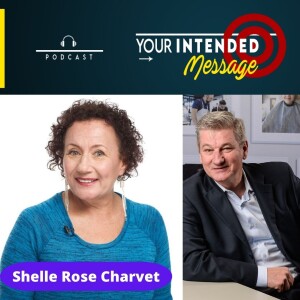
Thursday Sep 21, 2023
Words to Influence people: Shelle Rose Charvet
Thursday Sep 21, 2023
Thursday Sep 21, 2023
Power Words to influence people
What can you say to get more of what you want
Episode 173 (Shelle is based in Hamilton, Canada)
This is a repeat of the popular episode #10 from Oct 2020
In this conversation with Shelle Rose Charvet we explore:
- Recognizing that others don't think like you do
- The danger of trying to dig your way out of a hole
- Understanding the difference between suggestion and command language
- How to find the people who are most likely to say yes to your offer
- Why you might want to people around you who think differently
- What's the difference between "away from " vs "towards" language
- The difference between value and interesting
- How to decode their language before you respond
- When do you choose between options, process, details
- Internal vs external modes of influence
- Why you might use the phrase "but it's up to you"
About our guest Shelle Rose Charvet:
She is an expert in Influencing and Persuasion and author of Words that Change Minds.
Shelle works with organizations around the world and now remotely to help them understand what really motivates their clients.
When we recorded this interview she lived in Hamilton, Canada and spent time in Berlin. She speaks English, French, Spanish and is learning German.
-----
Excerpts from this conversation with Shelle Rose Charvet:
Well, the very first mistake that people make is that they unconsciously believe, like sometimes they are not aware of having this belief, they unconsciously believe that other people think the same way they do.
So, the mistake they make is they use the same strategy to convince other people that they used to convince themselves of something and then they are shocked and dismayed when other people do not just leap onto their bus and go wherever they want, what is wrong with those people, do not they get it.
Well, the issue is they need to get it in a way that is different than how I get it or how you get it and that is one of the very big mistakes.
So, other people do not necessarily think like me. I cannot find it hard to believe.
I know, is not it? Are they weird, is there something wrong with them?
Did not they go to school, did not they learn anything? Clearly they must understand me.
And I am a logical person, why are not they?
So, how do we overcome that challenge? I suppose, the first thing we need to recognize is that they are not necessarily trying to be difficult. They just think differently and not necessarily wrong, just differently. So, how do we overcome that challenge?
So, this is what the book words that change minds is all about. We need to understand that people have different values and criteria for making decisions so what is important to me may not be important to them, like one of the ways I like to convince people is I tell them things are interesting.
Well, interesting is my word for valuable and worth looking at, would not it be great if you asked somebody, well how do something is worthwhile taking a look at?
So, George, let me ask you just for a minute, how do you know that something is worthwhile to take a look at.
-----
Read the rest of this entry »
